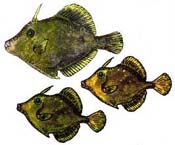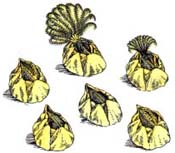 |
Green Filefish – Monacanthus hispidus, So called because of their sand papery skin, fishermen once used their hides to strike matches. Their dorsal spine has a trigger-like mechanism that makes it spring erect when they are threatened. Family: Balistidae/Leatherjackets |
 |
Hairy Brittlestar – Ophiothrix angulata, A very small starfish, so named because of the numerous "hairs" all over its legs. They live in sponges, and receive food carried into its hosts internal canals. Some species are reported to glow in the dark. Class: Stelleroidea, Sub-class: Ophiuroidea |
 |
Hermit Crab Hydroid – Hydractinia echinata, A bright pink hydroid that encrusts snail shells occupied by hermit crabs. Sometimes called "snail fur." Class: Hydrozoa |
 |
Ivory Barnacle – Balanus eburneus, A large white barnacle that grows on wharf pilings, shells and boat bottoms. They use their feathery appendages to sweep the water for plankton, and pour eggs and sperm into the water throughout most of the year. When the tide drops the cirri (feet) are retracted, the shell plates close. Sub-phylum: Crustacea, Class: Cirripedia |
 |
Keyhole Limpet – Diodora cayenensis, A primitive univalve with a conical hat-shaped shell. They are found on shells and rocks grazing on the algae. Class: Gastropoda, Family: Fissurellidae/Keyhole Limpets |
| « Previous | Next » |





